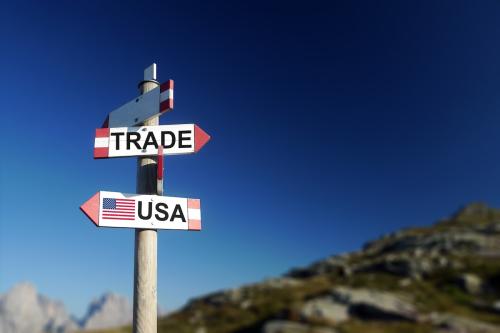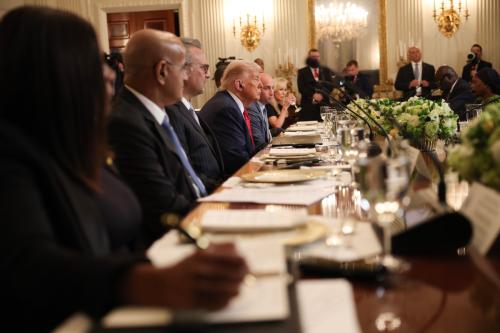|
 Clifford Gaddy, Senior Fellow, Center on the United States and Europe, Foreign Policy Program: Clifford Gaddy, Senior Fellow, Center on the United States and Europe, Foreign Policy Program:
Its foreign exchange reserves—and its nukes—are Russia’s ultimate lines of defense. If they are gone, or negated, Russia is defenseless. As long as the West keeps its sanctions (and they are expected to continue), it is essential in Putin’s mind that Russia keep the reserves.
That leaves a central banker with no good option. This rate hike won’t help, and since it is drastic but still doesn’t help, it just makes things worse in terms of expectations.
How far down can the ruble fall? There is always some equilibrium level. But now there’s panic. Psychology trumps market fundamentals, just like in a bank run. Unless there is a break fairly soon in the oil price fall or a signal that sanctions may be eased, the ruble will continue to weaken. Whatever else is left to do—and capital controls are an obvious, almost inevitable, option—to avoid drawing down the reserves will further harm the economy.
Western observers gloat. But we should instead be worrying about Russia reaching a tipping point where they feel that it’s clear the West is aiming to destroy them, that time is against them and that they have nothing to lose by acting in a drastic way and acting sooner rather than later. We should hope they find more things to try in the financial sphere before they say ‘stop’ and turn to military (and nonmilitary, “hybrid war”) options.
I can’t help thinking about the 2009 paper by Jeffrey Record, “Japan’s Decision for War in 1941: Some Enduring Lessons.” Oil to Japan then is foreign exchange to Russia today. Japan got 70 percent of its oil from the United States before we imposed the embargo in 1941. In late summer 1941, Japan’s oil reserves amounted to less than a year’s consumption, even with “strict wartime controls,” as the high command wrote in a memo. From the outside point of view, it made no sense for Japan to start a war with the United States, which economically was 10 times Japan’s size. But if they did nothing, they would be destroyed. And they thought the United States did not have the stomach for war. But the main thing was the perceived alternative of losing all sovereignty.
Record wrote (p. 21) that: “The United States was, in effect, demanding that Japan renounce its status as an aspiring great power and consign itself to permanent strategic dependency on a hostile Washington. Such a choice would have been unacceptable to any great power.”
|
|
 Jeremy Shapiro, Fellow, Center on the United States and Europe, Project on International Order and Strategy, Foreign Policy Program: Jeremy Shapiro, Fellow, Center on the United States and Europe, Project on International Order and Strategy, Foreign Policy Program:
If, as Cliff implies, the Russian government prefers Russian poverty to Russian dependence on the West, then the Russian economy, and by extension global stability, are in for a rough ride. Reserves are usually the first line of defense to prevent a currency crisis, but in the Russian case they seem to have become more of a strategic asset to hoard than an economic tool to deploy. The Russian Central Bank’s signal to the market that the reserves are not in play has both worsened the currency crisis and limited the efficacy of other economic tools. In general, the subservience of Russian economic policy to perceived security imperatives means that we should not expect Russian economic policymakers to find a graceful path through this crisis even if one exists.
None of this is good news. Many neo-Cold Warriors in the West are experiencing an almost hormonal level of schadenfreude and expecting the Russians to bow to economic reality in Ukraine. But having sacrificed the Russian economy on the altar of strategic independence, Russian leaders are unlikely to concede on core security issues simply because of a devastating currency crisis. And in any case, even grudging Russian concessions on Ukraine at this point would not likely reassure markets that Russian-Western relations are on a good long-term trajectory. More likely, Russian leaders will count on the famous Russian capacity for hardship, as well as a healthy dose of repression, to preserve domestic stability and the Russian regime through what might easily be a prolonged recession and (yet another) epic destruction of Russian savings. The presence of a foreign enemy to blame for the economic crisis will certainly help. As Cliff says, Russian aggression in some form seems a natural accompaniment to this policy.
If, as the West has claimed all along, the goal of economic sanctions has not been to destroy the Russian economy or bring hardship to ordinary Russians, then we are suffering from a catastrophic success. No one anticipated a coincident nearly 50 percent drop in the oil price in just a few months, but it has happened and the combination has been deadly to the Russian economy. Sanctions have once again proven to be hard to adjust to circumstances or to calibrate. But we need to at least try. The last Russian economic crisis in the late 1990s gave us the Putin regime; the next will not be any more satisfying. We cannot build a better relationship with Russia or create a more stable Europe on the rubble of the Russian economy. That means Western policymakers should think about how to prevent rather than encourage the Russian economic crisis we are witnessing. Without underestimating the difficulties of doing so, the best way to do that is to seek a genuine security compromise with Russia over its neighborhood that treats Russia as a great power even though it is in the midst of a serious economic crisis.
|
|
 Steven Pifer, Director, Arms Control and Non-proliferation Initiative; Senior Fellow, Center on the United States and Europe, Center for 21st Century Security and Intelligence Foreign Policy Program: Steven Pifer, Director, Arms Control and Non-proliferation Initiative; Senior Fellow, Center on the United States and Europe, Center for 21st Century Security and Intelligence Foreign Policy Program:
Putin and the Kremlin may have persuaded themselves that the goal of the economic sanctions is regime change, but is not. The goal is a change in Russian behavior toward Ukraine. I still believe that the sanctions have a chance of moving the Russians toward a settlement on eastern Ukraine. While Jeremy and I differ on the particulars of a compromise, I agree that now would be a good time for the West to signal to the Kremlin that:
- The sanctions would be eased if Russian policy toward Ukraine changed and;
- The West would be prepared to work with Kyiv and Moscow to find a face-saving way out for all. Putin might not believe it, but he would have the option of testing the proposition … or not.
|
|
 Fiona Hill, Director, Center on the United States and Europe; Senior Fellow, Foreign Policy Program: Fiona Hill, Director, Center on the United States and Europe; Senior Fellow, Foreign Policy Program:
The news that the president intends to sign the congressional sanctions bill and the ruble’s freefall will simply harden Putin’s assumptions that the United States and the West are targeting him and trying to implement regime change. As far as Putin is concerned, Russia is already at war with the West and he is thus now operating in a wartime scenario where Russia’s security and ultimate survival as a great power are uppermost in his mind, not salvaging economic competitiveness. The U.S. and EU sanctions have been damaging, but combined with the precipitous drop in oil prices (which, as Cliff and Jeremy note, we did not anticipate), they are ruinous.
If nothing happens to halt the fall of the ruble, and the CBR cannot get things under control, the nature of the Russian economy will be changed forever, along the lines of the kinds of dislocations we saw in the 1990s, with all the political knock-on effects. The effects will not be limited to Russia—they will reverberate across all the economies that have ties to the Russian economy, both inside the Eurasian Union (Armenia, Belarus, Kazakhstan), and outside, including in the European Union. This will weaken an already faltering neighborhood even further. Putin will not back down on his current policy (geopolitical and economic)—running the risks Jeremy and Cliff highlight above.
Absent some alternative signal from the United States, we are in a dangerous escalatory dynamic with Russia. The challenge is how all of us can test the proposition of finding a mutual face-saving way out of this crisis. We need some formula that goes beyond Ukraine and addresses Putin’s desires for Russia’s great-power status to be recognized and respected in some way in the European and global context, on the one hand, and that cedes no ground, on the other, on the fundamental principles of post-World War II security that Russia has violated. We also need a mechanism for engaging with Russia that keeps the United States and its European partners working together on this, perhaps in a format similar to the arrangements we have for dealing with Iran and its nuclear program.
Unfortunately, we may be close to the tipping point Cliff fears, which means we do not have the luxury of time to get our act together. The markets will not wait around while diplomats dither and deliberate about new Minsk or Geneva processes for engaging with Russia.
|
|
 Jeremy Shapiro: Jeremy Shapiro:
Steve and I do differ on the particulars of compromise, but those differences are very significant. Indeed, Steve’s use of the word “compromise” recalls to me this a classic Inigo Montoya line from The Princess Bride. It is not a compromise at all to remove our punishment (sanctions) in return for the Russians conforming to our policy demands, even if we allow some face-saving. That is a victory, even if in the 1990s we often told the Russians (and even believed ourselves) that such deals were compromises. I don’t think the Russians will accept that any more. And even if, because of economic difficulties, they had no choice but to accept, they would be resentful and we would simply find ourselves in similar difficulties when they eventually recover from their economic crisis—no doubt at the moment we are considering Belarussian membership in NATO. In this regard, I think Inigo Montoya also neatly encapsulates the basis of our post-Cold War Russia policy.
|
|
 Fiona Hill: Fiona Hill:
This, in fact, is Putin’s own personal tactic for dealing with adversaries. Threaten, and then follow through on the threats and punish; and then lift the punishment once the adversary has backed down and conformity is reached (all without having compromised on Russia’s position). Just like the six-fingered man, Putin will be wise to that approach before we even get around to adopting it.
|
|
 Steven Pifer: Steven Pifer:
We are clearly on a different wavelength, Jeremy (not for the first time!). Putin got himself and Russia into the sanctions mess by invading a sovereign country, albeit one in a deep political crisis. We should not forget that.
Decentralization, status for the Russian language, a channel to ameliorate the Ukraine-EU association agreement implementation’s impact on Ukraine-Russia economic relations, a Ukrainian decision to kick any consideration of NATO years down the road (and tie it to a referendum), NATO respect for that decision, plus deferring the resolution of Crimea’s status to the future are a reasonable basis for a settlement of eastern Ukraine. The Russians clearly don’t want the Donbas; they are using it as leverage to pressure and destabilize Kyiv. The points I just laid out would answer what Moscow has said it wants the past 10 months. They could be dressed up in a way that would allow the Russians to claim that they had protected their position.
Putin may believe we are about regime change, not a change in policy. But this is a proposition that he could test.
I do not believe we should let Russia break the fundamental rules of European security, construct an alternate reality about what they think is happening and what motivates Western actions, and then make concessions to that alternate reality. If the West does so, we should not be surprised when the Kremlin repeats the gambit.
Furthermore, if the United States maintains that it must not allow Putin to play by 19th century rules, then we must make sure that the Ukrainians are fully engaged. This is not just an issue between the West and Russia. The Ukrainians should get a vote in determining their own future.
|
|
 Lilia Shevtsova, Nonresident Senior Fellow, Center on the United States and Europe, Foreign Policy Program: Lilia Shevtsova, Nonresident Senior Fellow, Center on the United States and Europe, Foreign Policy Program:
This exchange demonstrates the key narratives in the Western approach to the current crisis in the relationship between Russia and the West, the war in Ukraine and the Russian internal developments.
Here are a couple of points in a way of brushstrokes in response from the Russian liberal perspective.
- On the Russian elites—will they rebel and replace Putin? Conformism and cowardice are still their nature, but the elites are definitely worried and are gradually becoming more and more nervous. They already understand that Putin does not guarantee their wellbeing and security. They will start–and have already started—looking for the new ways of survival. But they will hardly voice their desperation openly before the tide of protest rises. I believe that change in the the regime and leadership as a way to preserve the system of personalized power (which has a broad base of support) is becoming a very feasible option.
- On the current Central Bank response to the economic situation. The CBR is now under severe criticism for the rate hike and lack of consistency. But whatever they do, they can’t change the logic of the economic recession. They try to cure the consequences of the disease. Moreover, they make the things worse—by saving Rosneft they have triggered only a new wave of hysteria. Psychology, desperation and total paralysis of the Kremlin are running the show now.
- Fiona is right that Putin is at war and that this is a “wartime scenario”. This is the right diagnosis of the Russian situation. The war paradigm explains a lot. But the real question is this: what has forced the Kremlin to push Russia into a war paradigm? It seems that some participants of this discussion believe that the key reason has been “security” consideration that became “uppermost” to economics. Really? What exactly has changed in the security area? Has NATO suddenly awoken? Did Obama stop his retrenching? Or has Merkel started to threaten Putin? Pro-Kremlin experts would support the “security” explanation which has been often used by Putin himself and which justifies the Kremlin’s shift towards the militarist consolidation. Meanwhile, we are dealing with the old tradition of Russian personalized power turning to a war model at the stage of decay. Thus, this is not about security—this is about survival.
- The irony is that by turning to the war model, the Kremlin has activated the law of unintended consequences, and one of these consequences is the ruin of economy. Another is despair among the elites. One more consequence: TV as the main mobilizer of people has been replaced by the refrigerator and stomach.
- Someone has argued here that the Western sanctions could only strengthen the convictions among Russians that the “West is destroying Russia”. The historical analogy (the case of Japan) has been used to prove that the West should avoid humiliation of the nation with great power longings. My observations here in Russia allow me to conclude that despite the Kremlin’s powerful propaganda and brain washing, there are a lot of savvy people in Russian society who see the Kremlin as responsible for the current economic downfall. True, the Kremlin and its propaganda are trying to beef up the “Weimar complex” among Russians. But the polls say that the “humiliation syndrome” has started to wear off. According to the Levada Center, Russians are not eager to pay for the military actions in Ukraine and to send their sons to fight there. Should Western analysts base their conclusions on the “humiliation saga”? To do so would help the Kremlin’s survival mechanisms. One more thing: I wonder whether Putin and the Kremlin folks really feel any humiliation, even now, at the moment of downfall. I would say that the Kremlin revisionism is rather the outcome of another state of mind: cockiness and self-assuredness.
- I am definitely with Steve on the issue of “compromises” with the Kremlin. In fact, this is the Kremlin that, through various rhetorical exercises, offers the compromise “over the neighborhood”, that is to return to the Yalta-Potsdam division of the areas of interests. We have to specify what this compromise would mean: rejection of many international laws and agreements that guarantee territorial integrity and sovereignty (in Europe too!), including the Helsinki process. This will be the surrender of the liberal democracies before the blackmail of the militarist regime. But will it guarantee that the other side will observe the new deal if the key reason for its expansionism and revisionism has an internal (not external!) nature? What a great example for China to experiment with compromises further! In any case, Western acquiescence during the last decade did not prevent the Kremlin from kicking over the global chessboard.
- But the compromise would always mean that two sides should make some concessions, you would say. My answer will be: why do you advise the West to surrender the principles? By the way, any compromise that link between the EU-Ukraine association agreement with the Russian agenda and the Ukrainian guarantee that it will not ask for NATO membership—is limitation of the Ukrainian sovereignty! Let Ukrainians decide how they will see their role in the world.
- Whatever tactical compromises are considered, Ukrainians have to decide about its nature and how they will build their future trajectory. I don’t think that any state outside should advise Ukraine on the nature of any compromise. Let’s not play with the Munich ghosts!
Finally, I would agree with Steve: “the Kremlin could repeat the gamble.” And not because Putin has a bad and aggressive character; this is the nature of the system at the stage of degradation that wants to prolong its life.
|
|
 Fiona Hill: Fiona Hill:
Lilia nails the difficulties here. We have to find ways of sticking to our principles and giving Ukraine agency in whatever approach we take. Cockiness and self-assuredness can also accompany a sense of humiliation—they are ways of over compensating. And Putin has enjoyed sticking it to the United States and the West at every opportunity to make up for all the times he and those around him feel that we stuck it to them. There is a tit-for-tat quality that is not just rhetorical in everything that has happened over the last year. Putin still wants to punish the West, and Ukraine along with it, to make a point and get us to back down. But as the saying goes you can cut off your nose to spite your face, and here we are. Perhaps what we need to do is look for some temporary or interim proposition (as we have been doing with Iran on the nuclear program), rather than try to thrash out any long-term arrangement. Like in the case of Iran, Putin wants the sanctions lifted, but he doesn’t want to do anything that will really constrain his room for maneuver and preclude other gambits. We are in for a long-hard slog here.
|
|
 Steven Pifer: Steven Pifer:
In response to Lilia’s point about compromises on the EU-Ukraine association agreement and Ukraine putting off NATO ambitions to the future infringing on Ukrainian sovereignty, she is right that Kyiv should have a voice on these. But the Ukrainian government has suggested these kinds of ideas going back to June. The problem is that Russia has not picked up and engaged on them, which feeds my concern that, to date, Moscow is not interested in a compromise that could be accepted in Kyiv, but simply wants to sow chaos and instability in eastern Ukraine as a means to make things difficult for the Ukrainian government and slow, if not derail, its effort to draw closer to the European Union.
|
 Clifford Gaddy, Senior Fellow, Center on the United States and Europe, Foreign Policy Program:
Clifford Gaddy, Senior Fellow, Center on the United States and Europe, Foreign Policy Program: Jeremy Shapiro, Fellow, Center on the United States and Europe, Project on International Order and Strategy, Foreign Policy Program:
Jeremy Shapiro, Fellow, Center on the United States and Europe, Project on International Order and Strategy, Foreign Policy Program: Steven Pifer, Director, Arms Control and Non-proliferation Initiative; Senior Fellow, Center on the United States and Europe, Center for 21st Century Security and Intelligence Foreign Policy Program:
Steven Pifer, Director, Arms Control and Non-proliferation Initiative; Senior Fellow, Center on the United States and Europe, Center for 21st Century Security and Intelligence Foreign Policy Program: Fiona Hill, Director, Center on the United States and Europe; Senior Fellow, Foreign Policy Program:
Fiona Hill, Director, Center on the United States and Europe; Senior Fellow, Foreign Policy Program: Lilia Shevtsova, Nonresident Senior Fellow, Center on the United States and Europe, Foreign Policy Program:
Lilia Shevtsova, Nonresident Senior Fellow, Center on the United States and Europe, Foreign Policy Program:


Commentary
Around the Halls: Has the Ruble Gone to Rubble?
December 17, 2014